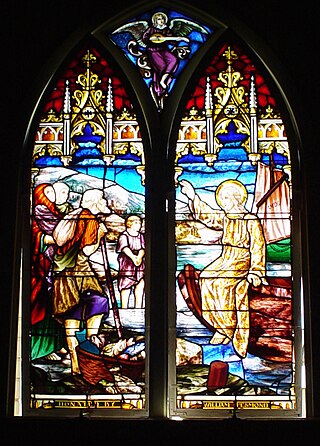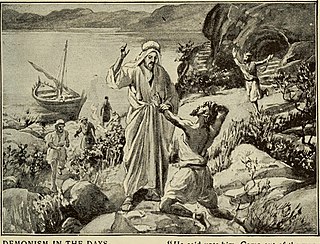Related Research Articles

John 20:17 is the 17th verse of the twentieth chapter of the Gospel of John in the New Testament. It contains Jesus' response to Mary Magdalene just after he meets her outside his tomb after his resurrection. According to the longer ending of Mark's Gospel Mary Magdalene is the first person to whom Jesus shows himself alive after his resurrection.

Matthew 3:11 is the eleventh verse of the third chapter of the Gospel of Matthew in the New Testament. The verse occurs in the section relating the preachings of John the Baptist. In this verse he predicts that he will be followed by someone much greater than himself. The main theme of this verse is that John will soon be supplanted by a much greater figure and that John's water baptism is just a preparation for the much greater baptism with the Holy Spirit and fire.

Matthew 4:2 is the second verse of the fourth chapter of the Gospel of Matthew in the New Testament. This verse is just preceding the section in Matthew dealing with the temptation of Christ by Satan. Jesus has been led out into the wilderness, and in this verse he fasts.
Matthew 8:9 is the ninth verse of the eighth chapter of the Gospel of Matthew in the New Testament. This verse continues the miracle story of healing the centurion's servant, the second of a series of miracles in Matthew.

Matthew 8:8 is the eighth verse of the eighth chapter of the Gospel of Matthew in the New Testament. This verse continues the miracle story of healing the centurion's servant, the second of a series of miracles in Matthew.

Matthew 8:21 is the 21st verse in the eighth chapter of the Gospel of Matthew in the New Testament of the Christian Bible.
Matthew 11:29 is the 29th verse in the eleventh chapter of the Gospel of Matthew in the New Testament.

Matthew 10:3 is the third verse in the tenth chapter of the Gospel of Matthew in the New Testament.
Matthew 12:48 is the 48th verse in the twelfth chapter of the Gospel of Matthew in the New Testament.

Matthew 8:15 is the fifteenth verse in the eighth chapter of the Gospel of Matthew in the New Testament which relates the Healing the mother of Peter's wife.

Matthew 8:29 is the 29th verse in the eighth chapter of the Gospel of Matthew in the New Testament.
Matthew 10:37 is a verse in the tenth chapter of the Gospel of Matthew in the New Testament.
Matthew 14:14 is the fourteenth verse in the fourteenth chapter of the Gospel of Matthew in the New Testament.
Matthew 14:12 is the twelfth verse in the fourteenth chapter of the Gospel of Matthew in the New Testament. It refers to the death of John the Baptist and the burial of his body.
Matthew 12:30 is the 30th verse in the twelfth chapter of the Gospel of Matthew in the New Testament.

Matthew 15:23 is a verse in the fifteenth chapter of the Gospel of Matthew in the New Testament.

John 1:29 is the twenty-ninth verse in the first chapter of the Gospel of John in the New Testament of the Christian Bible.

John 1:16 is the sixteenth verse in the first chapter of the Gospel of John in the New Testament of the Christian Bible.

Matthew 12:43-45 is a passage comprising the 43rd to 45th verses in the twelfth chapter of the Gospel of Matthew in the New Testament.

Matthew 15:3-6 is a set of verses in the fifteenth chapter of the Gospel of Matthew in the New Testament.
References
- ↑ John MacEvilly, An Exposition of the Gospel of St. John consisting of an analysis of each chapter and of a Commentary critical, exegetical, doctrinal and moral, Dublin, Gill & Son 1879.
- ↑ Robert Witham, Annotations on the New Testament of Jesus Christ. Dublin: 1730.
- 1 2 3 "Catena aurea: commentary on the four Gospels, collected out of the works of the Fathers: Volume 6, St. John. Oxford: Parker, 1874. Thomas Aquinas".
 This article incorporates text from this source, which is in the public domain .
This article incorporates text from this source, which is in the public domain .